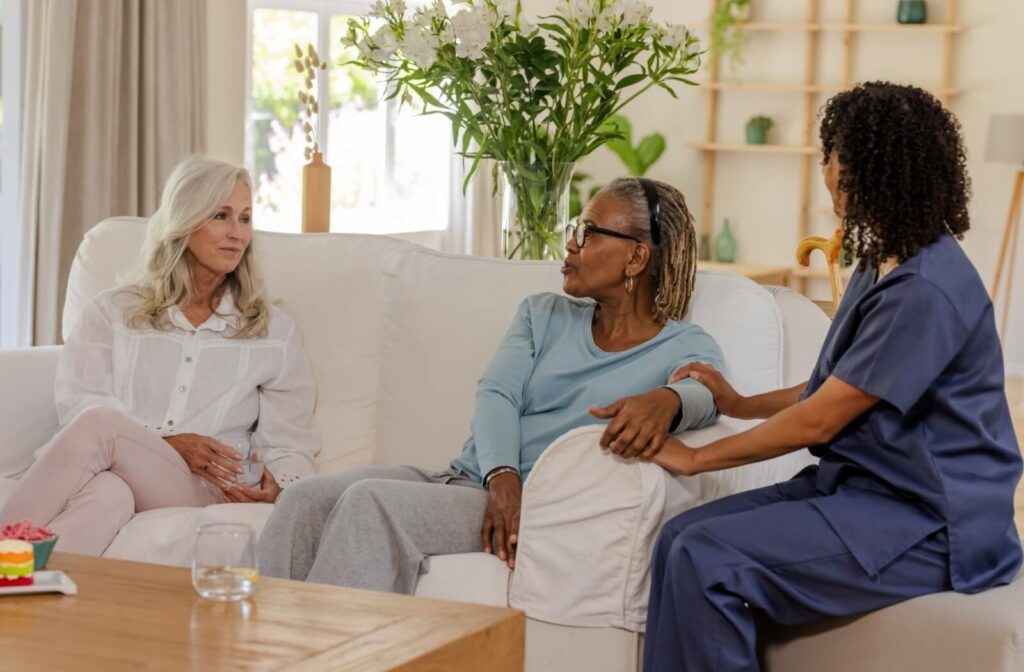Key Takeaways
- Personal care provides daily support with activities like meals, grooming, and medication reminders.
- It’s a good option for older adults who want independence but need extra help.
- Signs your loved one may benefit include safety concerns, isolation, or difficulty with daily routines.
- Personal care communities provide structure, wellness programs, and social connection.
Caring for an aging loved one often raises important questions about when it’s time to seek additional support. Families may notice changes in daily routines, health, or overall well-being that suggest more help is needed. While moving to a personal care community can feel like a big step, it’s often the right choice for creating stability, safety, and peace of mind.
The way to know if personal care is right for your loved one is by recognizing the signs—such as challenges with daily tasks, safety concerns, or isolation—and understanding how a supportive community can provide both assistance and independence. Personal care bridges the gap between living alone and requiring full-time medical care, offering the right level of help while respecting autonomy and enriching daily life. For families in Pittsburgh, making this choice can ensure older adults continue to thrive with confidence and connection.
What Is Personal Care?
Personal care is a lifestyle designed for older adults who need help with everyday routines but don’t require 24/7 skilled nursing. It provides support with activities of daily living, or ADLs, such as:
- Bathing and grooming
- Dressing
- Medication reminders
- Meal preparation and dining support
- Housekeeping and laundry
- Transportation services
The goal is to make life easier and safer while preserving independence. Personal care also includes social programs, wellness opportunities, and access to team members who are available around the clock if assistance is needed.
What Are the Signs That Personal Care May Be Needed?
Deciding whether personal care is the right step often starts with noticing small changes at home.
Difficulty with Daily Routines
If cooking, dressing, or managing medications has become a challenge, personal care can provide reliable assistance. This ensures your loved one maintains good nutrition, hygiene, and overall wellness without unnecessary stress.
Increased Safety Concerns
Falls, wandering, or confusion can create serious risks for older adults. Personal care communities are designed with safety in mind, offering accessible layouts, emergency systems, and team support at any time of day.
Signs of Isolation or Loneliness
Many older adults live alone, which can lead to feelings of isolation. Personal care communities offer companionship, shared meals, and group programs that encourage engagement and joy.
Family Caregiver Stress
Providing daily support as a caregiver can become overwhelming. Personal care offers peace of mind by ensuring your loved one receives consistent, compassionate help while giving families time to focus on quality moments together.

How Does Personal Care Support Independence?
Some families worry that moving into personal care means losing independence. In reality, it often preserves it.
Encouraging Choice
Older adults choose how to spend their time, from dining options to programs and activities. Assistance is provided only when needed, allowing for autonomy in daily life.
Removing Daily Burdens
Housekeeping, laundry, and meal preparation are handled by the community, so individuals have more time and energy for the things they enjoy.
Access to Wellness Programs
Personal care often includes fitness classes, social programs, and creative opportunities. These offerings support mental and physical well-being while helping community members stay active.
What Are the Key Benefits of Personal Care for Families?
Personal care is not only supportive for older adults—it also eases the responsibilities of family caregivers.
- Peace of mind: Families know their loved one is safe, supported, and connected.
- Consistency: Trained team members provide reliable support, which reduces worry about missed medications or skipped meals.
- More quality time: Instead of focusing on caregiving tasks, families can enjoy meaningful visits and experiences together.
How Do Personal Care Communities Create a Sense of Belonging?
Moving to personal care isn’t just about receiving help—it’s about joining a vibrant community.
- Social connection: Shared meals, game nights, and cultural outings create opportunities for friendships.
- Routine and structure: Predictable schedules help older adults feel secure while leaving room for flexibility and choice.
- Engagement: Programs and events are tailored to different interests, whether that’s art, music, exercise, or learning something new.
This supportive environment ensures that older adults not only have their needs met but also thrive emotionally and socially.
When Is the Right Time to Explore Personal Care?
There’s no single answer, but families often begin exploring personal care when:
- An older adult struggles with daily routines.
- Health and safety risks increase at home.
- Caregiver stress becomes overwhelming.
- Isolation or loneliness affects mood and well-being.
It’s always better to begin the conversation early rather than waiting for a crisis. Touring communities, talking with team members, and learning about available services can help families make an informed choice with confidence.
Personal Care for Your Loved One in Pittsburgh
Personal care is a compassionate option for older adults who want to remain independent but need extra support in daily life. It creates a balance between assistance and autonomy, ensuring safety, structure, and community connection.
At Juniper Village at Forest Hills, personal care is delivered with warmth and respect, tailored to the unique needs of each individual. With supportive programs, wellness opportunities, and a welcoming atmosphere, families can feel confident that their loved ones are surrounded by care that honors both dignity and independence.
Get in touch today to schedule a visit and see how personal care at Juniper Village at Forest Hills can help your loved one thrive.







